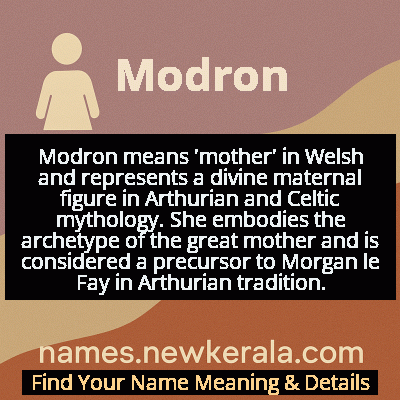Modron Name Meaning & Details
Origin, Popularity, Numerology Analysis & Name Meaning of Modron
Discover the origin, meaning, and cultural significance of the name MODRON. Delve into its historical roots and explore the lasting impact it has had on communities and traditions.
Name
Modron
Gender
Female
Origin
Arthurian
Lucky Number
7
Meaning of the Name - Modron
Modron means 'mother' in Welsh and represents a divine maternal figure in Arthurian and Celtic mythology. She embodies the archetype of the great mother and is considered a precursor to Morgan le Fay in Arthurian tradition.
Modron - Complete Numerology Analysis
Your Numerology Number
Based on Pythagorean Numerology System
Ruling Planet
Neptune (Ketu)
Positive Nature
Intuitive, analytical, spiritual, and inquisitive.
Negative Traits
Secretive, reserved, aloof, and can be overly critical.
Lucky Colours
Green, yellow.
Lucky Days
Monday.
Lucky Stones
Cat’s eye, moonstone.
Harmony Numbers
1, 5, 6.
Best Suited Professions
Scientists, researchers, spiritual leaders, detectives.
What People Like About You
Depth of knowledge, analytical skills, spirituality.
Famous People Named Modron
Modron ferch Avallach
Mythological Figure
Mother of Mabon ap Modron in Welsh mythology
Modron (Morgan le Fay precursor)
Mythological Character
Possible prototype for Morgan le Fay in Arthurian legend
Modron of the Mabinogion
Literary Character
Appears in Welsh Triads as a significant maternal figure
Name Variations & International Equivalents
Click on blue names to explore their detailed meanings. Gray names with will be available soon.
Cultural & Historical Significance
Her presence in Welsh Triads and the Mabinogion establishes her as a foundational maternal archetype in Celtic mythology, embodying the concept of divine motherhood and territorial sovereignty that was central to pre-Christian Celtic religious beliefs. Modron's cultural significance extends beyond mere mythology into the realm of cultural identity, representing the enduring power of maternal lineage and the importance of mother figures in maintaining cultural continuity and social structure in ancient Celtic societies.
Extended Personality Analysis
As a divine maternal figure, Modron embodies nurturing strength, protective instincts, and profound wisdom. She represents the archetype of the powerful mother who commands respect through her inherent authority rather than aggression. Her personality combines deep compassion with formidable will, reflecting the dual nature of motherhood as both nurturing and fiercely protective. In mythological contexts, she demonstrates resilience and perseverance, particularly in stories involving her son Mabon, where she exhibits the enduring strength of maternal love.
Modern interpretations might associate the name with women who possess natural leadership qualities, emotional intelligence, and a strong connection to tradition and heritage. The name suggests someone who is both grounding and inspiring, able to provide stability while encouraging growth in others. These traits align with her mythological role as a foundation figure in Welsh cosmology, representing the enduring power of maternal principles in both family and community contexts. Individuals named Modron would likely be perceived as having a strong sense of responsibility, deep emotional reserves, and the ability to nurture and guide others while maintaining their own authority and independence.
Modern Usage & Popularity
In contemporary times, Modron remains an extremely rare given name, primarily used by enthusiasts of Celtic mythology, Arthurian scholars, or parents seeking unique names with deep mythological roots. The name has seen minimal usage in birth records, maintaining its status as an obscure but culturally significant choice. Its rarity makes it appealing to those looking for distinctive names that honor Welsh heritage and mythological traditions. The name occasionally appears in pagan and neo-druid communities where ancient Celtic names are revived and celebrated. While not trending in mainstream naming practices, Modron maintains a steady presence in academic and mythological circles, and its connection to Morgan le Fay gives it some recognition among Arthurian legend enthusiasts. The name's usage reflects a growing interest in reviving ancient mythological names while preserving their cultural and historical significance.
Symbolic & Spiritual Meanings
Modron symbolizes the primordial mother archetype, representing fertility, nurturing, protection, and the cyclical nature of life. As a divine maternal figure, she embodies the concept of sovereignty over land and people, connecting earthly rulership with maternal authority. Her symbolism extends to themes of wisdom passed through generations, the enduring strength of maternal bonds, and the protective power of the feminine divine. The name carries connotations of ancient wisdom, earth-centered spirituality, and the transformative power of motherhood. In a broader metaphorical sense, Modron represents the foundation upon which civilizations are built—the maternal principle that nurtures, protects, and sustains both family and community. Her symbolism bridges the natural and supernatural worlds, embodying the idea that true power arises from nurturing and preservation rather than domination, making her a potent symbol of feminine strength and cultural continuity.

